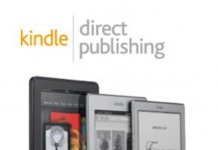Jeff Bezos’s Amazon stock is up 99 percent in the past 52 weeks.
Also, his personally owned Washington Post drew in more readers online than the New York Times did last month, by one measurement.
Want to celebrate, Jeff? Here’s a great way. Share a little more of Amazon’s wealth with Kindle Unlimited writers. That said, I’ve revised this post after finding that Amazon’s definition of “Kindle Edition Normalized Page Count” is more favorable than I expected toward authors paid by KENPC.
Now—a negative, the reason I wrote the post in the first place: Over at the Foner Books, Morris tells us that “the payment per page read for October was $0.0048 or 0.48 cents per page” for Kindle Direct Publishing writers signed up for Kindle Unlimited. “When the new pay-per-page model launched in July, that payment was $0.0058, or 0.58 cents per page. So in four months, the royalty has dropped by a tenth of a cent per page, which is getting close to twenty percent.”
 That’s for the U.S., and the per-page payments in the the UK, Canada, India and Germany are about the same although geo-adjustments are on the way.
That’s for the U.S., and the per-page payments in the the UK, Canada, India and Germany are about the same although geo-adjustments are on the way.
What does 0.48 cents per page mean for a 400-page book read all the way? $1.92. Is that good or bad? For comparison’s sake, let’s consider that at an optimal royalty rate of 70 percent for a Kindle Direct-published e-book going for $4, the author would receive $2.80 and $1.40 at a 35 percent rate no matter how many pages were read of this owned book. And that’s the catch—“no matter how many”! Lots of books, nonfiction in particular, are not read all the way. So more realistically, the $1.92 for the 400-page book under Kindle Unlimited might actually end up as $1.50 and in many cases much much much less per average book for the writer, particularly anyone foolish enough to try literary fiction (sarcasm alert). Even considering that we’re talking about rental vs. buying, the writer should be getting more from the former than he or she does now.
Keep in mind that Kindle Unlimited members are paying $9.99 a month. Let’s guess that the average member reads 6 books a month, substantially more than the five per year which the average American adult takes in. That’s $1.67 in revenue per book for Amazon within the month, and it in fact might be much more if I’ve overestimated the average number of books the members read.
Based on the above, it appears on the surface that Kindle Unlimited might be wildly underpaying many authors. Ah, but here’s the kicker that makes this call a bit trickier even though I still think writers should be getting more. An indie author named Aric Mitchell writes that his book with an estimated length of 172 pages (I don’t know what the word count per page was) ended up at 292 KENPC pages. Another writer, Lynn Messina, reports that a book starting out at 278 pages in hard copy was 535 pages in KENPC.
Even with the KENPC positive considered, however, Mitchell went with the headline: Kindle Unlimited KENPC Explained: Self-Published Authors Could Be Looking at Massive Page Cut. Again, we’re talking about payments based on pages actually read, and he links to a Guardian piece gloomy about authors’ prospects under the rental program.
No, I don’t think Amazon should pay a rented book’s entire list price—Kindle Unlimited obviously wants to avoid an Oyster and watch the bottom line—but perhaps the company can do better even if it feels it cannot get fully back to July’s levels. Why not consider adjusting the kitty ($12.4 million as of October) upward at a somewhat faster rate than Amazon has been doing?
In a related vein, Jeff Bezos and friends might check out Amazon Tweaks Its Kindle Unlimited System: It Still Sucks for KDP Select Authors, by John Scalzi, who zeros in on on the kitty-based business model and the fact this this is a zero-sum game pitting writer against writer. Bottom line: “By page, or by percentage, KDP Select authors on Kindle Unlimited still can’t make more than Amazon says they can. That sucks, and that’s the long and short of it.” $12.4 million from October is chickenfeed in the grand scheme of things in Bestseller Land. Accurately or not—keep in mind the source here—word is that Hillary Clinton’s biography may have gotten her an advance of $14 million from Simon & Schuster. What’s more, Amazon’s revenue was $100.59 billion for the 12 months ended September 30, 2015.
I know Jeff would reply something like this, “We’re already making sacrifices all over Amazon. We’re investing in our company in ways ranging from R&D tp market development even if we must keep our earnings down to grow value for investors in the long run. But we can’t operate everything at breakeven or a loss.”
Long term, however, regardless of the need for sustainability for Kindle Unlimited, it also would be wonderful to see him invest more in the careers of Kindle Unlimited writers, especially mid-list ones (an issue about which I of course would feel the same in regard to large publishers).
Who knows? Maybe better-paid writers would produce better books and add to that sustainability.
Jeff, none other than your own wife is a novelist. I wonder how she would feel about the current Kindle Unlimited payments, regardless of the of the advantages that writers enjoy with KENPC.
Related: For a different perspective, see Doing the Math on Kindle Unlimited, TeleRead Editor Chris Meadows’s commentary from this past summer.
(Foner Books item via Nate.)
































